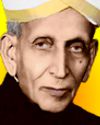 (source)
(source)
|
Mokshagundam Visvesvaraya
(15 Sep 1860 - 14 Apr 1962)
Indian civil engineer and statesman who devoted his life to India’s nation building, with rural developments and industrialization. He was responsible for waterworks, irrigation, dams, flood control among other significant improvements. His birthday is now commemorated in India as Engineer’s Day
|
Science Quotes by Mokshagundam Visvesvaraya (18 quotes)
An Englishman, unless asleep, feels an invisible compulsion to be doing something, to consider time as of some importance. With us, according to custom and tradition, the charm of life consists in ease—ease from the absence of compulsion to do anything.
— Mokshagundam Visvesvaraya
Comparing English and Indian culture in Address to Mysore Civil Engineers Association (14 Nov 1910), collected in Speeches by Sir M. Visvesvaraya, KCIE. Dewan of Mysore. 1910-11 to 1916-17 (1917), 11.
As compared with Europe, our climate and traditions all pre-dispose us to a life of inaction and ease. We are influenced either by religious sentiment, class patriotism or belief in kismet, whereas the activities of Western nations rest on an economic basis. While they think and act in conformity with economic necessities, we expect to prosper without acquiring the scientific precision, the inventive faculty, the thoroughness, the discipline and restraints of modern civilisation.
— Mokshagundam Visvesvaraya
Speech (16 Mar 1912), at Central College Bangalore Visvesvaraya. Collected in Speeches: 1910-11 to 1916-17: by Sir Mokshagundam Visvesvaraya (1917), 23.
I favour both heavy industries and village industries. … I am in favour of heavy industries because heavy industries will save the money that is going out of the country in large sums every year; heavy industries are required to provide the local manufactures of machinery and equipment required by our railways and for defence forces and heavy industries are required also for supplying machinery and tools for the village industries themselves.
— Mokshagundam Visvesvaraya
In letter (1934), replying to Mahatma Gandhi explaining his different vision for the future of India.
I walked my way to good health.
— Mokshagundam Visvesvaraya
Response when asked late in life about the secret for his health. As given in the chapter by R.K. Murfi, 'Visvesvaraya', collected in Remembering Our Leaders: Volume 2 (1989), 51.
If we are to follow in the wake of other countries in the pursuit of material prosperity, we must give up aimless activities and bring our ideals into line with the standards of the West, namely, to spread education in all grades, multiply occupations and increase production and wealth. All other activities should conform themselves to the economic ideal.
— Mokshagundam Visvesvaraya
Speech (16 Mar 1912), at Central College Bangalore Visvesvaraya. Collected in Speeches: 1910-11 to 1916-17: by Sir Mokshagundam Visvesvaraya (1917), 23.
In a French book recently translated by Sir William Moyer of Madras, the author [Joseph Chailley] says: “If India possessed a more fertile soil and were better endowed with mineral wealth, she would still languish in poverty if the natives continued to work with the same apathetic indifference as at present. Slackness is the worst curse of the country. At first sight, everybody seems to be taking an active part in some common toil; as a matter of fact, several persons are looking on at the labour of one. As has been cynically remarked, out of five people who seem to be working, one is doing nothing, one is resting, one is looking on and another is helping the previous three. Everyone endeavours to escape his full toll of toil.”
— Mokshagundam Visvesvaraya
Quoting a disappointing foreign criticism of Indian culture in his Address to Mysore Civil Engineers Association (14 Nov 1910), collected in Speeches by Sir M. Visvesvaraya, KCIE. Dewan of Mysore. 1910-11 to 1916-17 (1917), 11. The book being quoted was M.J. Chailley (Member of the French Chamber of Deputies), L'Inde Britannique (1910), 104; as translated by Sir William Moyer as Administrative Problems Of British India (1910), 155. The translation of “slackness”, comes from original French sentence L’oisiveté est son piro mal. [Or “Idleness is its worst hindrance.” —Webmaster’s translation]
In our warm climate, we have not got the same incentive to exertion and we may never be able to attain the same level of prosperity as Western people.
— Mokshagundam Visvesvaraya
Address to the Mysore Economic Conference. Collected in Speeches: 1910-11 to 1916-17: by Sir Mokshagundam Visvesvaraya (1917), 85.
Industrialise or perish.
— Mokshagundam Visvesvaraya
Personal motto. As given in Jyoti Bhusan Das Gupta (2007). Science, Technology, Imperialism, and War (2007), 248. Gupta contrasts this with Mahatma Gandhi’s viewpoint: “Industrialise and perish.”
It is better to work out than rust out.
— Mokshagundam Visvesvaraya
His explanation for active exercising even late in life. As given in the chapter by R.K. Murfi, 'Visvesvaraya', collected in Remembering Our Leaders: Volume 2 (1989), 63.
Mental energy is wasted in caste disputes and village factions.
— Mokshagundam Visvesvaraya
Speech (3 Jun 1914), 'Address to the Mycore Economic Conference'. Collected in Speeches: 1910-11 to 1916-17: by Sir Mokshagundam Visvesvaraya (1917), 152.
Progress in every country depends mainly on the education of its people. Without education, we are a nation of children. The difference between one man and another, apart from birth and social position, consists in the extent of knowledge, general and practical, acquired by him. We may safely assume that man in all countries within certain limits start with the same degree of intelligence. A civilised nation is distinguished from an uncivilised one by the extent of its acquired intelligence and skill.
— Mokshagundam Visvesvaraya
Epigraph for the chapter by R.K. Murfi, 'Visvesvaraya', collected in Remembering Our Leaders: Volume 2 (1989), 46. Partly quoted in V.S. Narayana Rao, Mokshagundam Visvesvaraya: His Life and Work (1973), 33.
Progress on modern lines is a necessity. We cannot afford to ignore scientific discoveries which have almost vivified material nature. Past ideals were for past times. We must adapt ourselves to the everlasting conditions of existence or be content to be left behind in the race for material prosperity.
— Mokshagundam Visvesvaraya
Speech (10 Mar 1912) at Bangalore Central College Day Meeting, collected in Speeches: 1910-11 to 1916-17: by Sir Mokshagundam Visvesvaraya (1917), 30.
The educational principle, of the twentieth century is the education of all the people for the work of the people. In Western countries, the expenditure on education and technical training is considered a national investment. That is why most of the Western countries have resorted to compulsory education.
— Mokshagundam Visvesvaraya
Speech (7 Jan 1911), at the School For Deaf Mutes and the Blind. Collected in Speeches: 1910-11 to 1916-17: by Sir Mokshagundam Visvesvaraya (1917), 16.
The Indian mind needs to be familarised with the principles of modern progress, a universal impulse for enquiry and enterprise awakened, and earnest thinking and effort promoted. A new type of Indian citizenship purposeful, progressive and self-respecting should be created, and self-reliant nationhood developed.
— Mokshagundam Visvesvaraya
In Reconstructing India (1920), Preface, v.
The young engineer may lay to heart the advice which Mr. Moberly Bell of the London Times gave … “If your business,” said he, “is only to sweep a crossing, remember that it is your duty to make that crossing the best swept in the world.”
— Mokshagundam Visvesvaraya
Address to Mysore Civil Engineers Association (14 Nov 1910), collected in Speeches by Sir M. Visvesvaraya, KCIE. Dewan of Mysore. 1910-11 to 1916-17 (1917), 10.
There are still people among us who believe that the golden age was in the past. We are devoted to past ideals … There is a yearning for the old ideals and a half-hearted acquiescence in the new and, on the whole, the genius of the people is for standing still.
— Mokshagundam Visvesvaraya
Speech (3 Jun 1914), 'Address to the Mycore Economic Conference'. Collected in Speeches: 1910-11 to 1916-17: by Sir Mokshagundam Visvesvaraya (1917), 149.
There is waste going on in the business life of our people in many ways—waste both of resources and of opportunities. There is waste of energy due to insufficient occupation, because agriculture gives full employment for only six or seven months in the year. There is waste due to illiteracy, because ninety-four persons out of every hundred are uneducated. There is waste through ignorance of the ways of the civilized people, because we fail to utilize their accumulated asset of wisdom and experience. Waste is also going on through our imperfect acquaintance with the commonplaces of civilization and lack of correct business ideals and business standards in daily life. Mental energy is wasted in caste disputes and village factions. Capital is wasted because money is hoarded instead of being made available for productive purposes. There is waste of health because, although leading moral lives normally, men and women grow prematurely old for want of pride of person and attention to the elementary laws of health. The largest waste of all is the lack of capacity for cooperation, the difficulty of ensuring harmony, sympathy and oneness of feeling, in matters affecting the larger interests of the State.
— Mokshagundam Visvesvaraya
Speech (3 Jun 1914), 'Address to the Mycore Economic Conference'. Collected in Speeches: 1910-11 to 1916-17: by Sir Mokshagundam Visvesvaraya (1917), 152-153.
Under present conditions in India, agriculture gives a bare living, sometimes less than a living, to those who pursue that calling. … Industrial activity is everywhere regarded as a higher species of employment, and is decidedly more remunerative than agriculture.
— Mokshagundam Visvesvaraya
In Reconstructing India (1920), 153-154.
See also:
- 15 Sep - short biography, births, deaths and events on date of Visvesvaraya's birth.
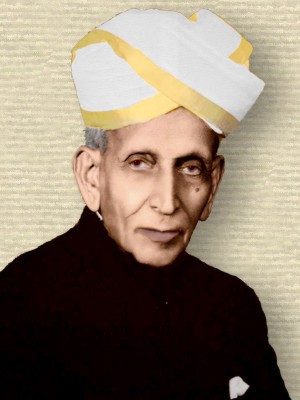

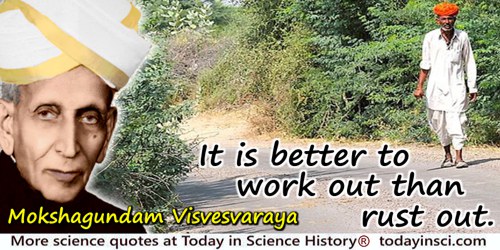
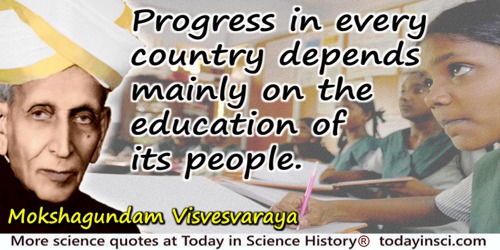
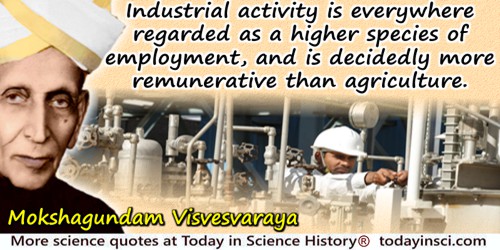
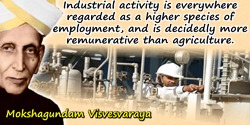
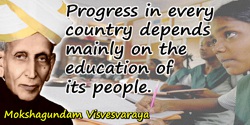
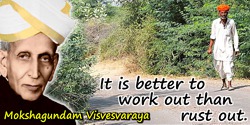
 In science it often happens that scientists say, 'You know that's a really good argument; my position is mistaken,' and then they would actually change their minds and you never hear that old view from them again. They really do it. It doesn't happen as often as it should, because scientists are human and change is sometimes painful. But it happens every day. I cannot recall the last time something like that happened in politics or religion.
(1987) --
In science it often happens that scientists say, 'You know that's a really good argument; my position is mistaken,' and then they would actually change their minds and you never hear that old view from them again. They really do it. It doesn't happen as often as it should, because scientists are human and change is sometimes painful. But it happens every day. I cannot recall the last time something like that happened in politics or religion.
(1987) -- 


